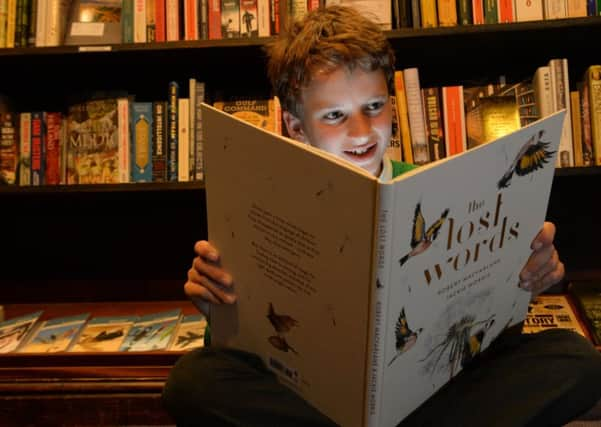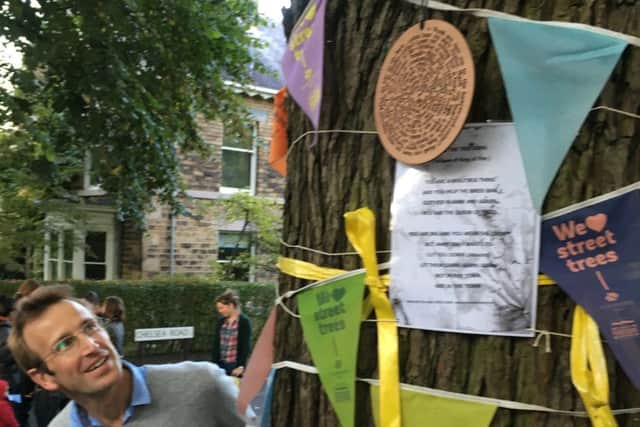Fundraising success sees nature's '˜lost words' reappear at hundreds of Yorkshire primary schools


An organic campaign that became a natural phenomenon has resulted in hundreds of primary schools across Yorkshire - along with libraries and GP surgeries – receiving copies of books celebrating disappearing words of nature that have been cut from junior dictionaries.
From ‘otter’ to ‘kingfisher’, ‘dandelion’ to ‘bramble’, The Lost Words featuring ‘spell-poems’ by author Robert Macfarlane and illustrations by artist Jackie Morris is to reach audiences of children in North and East Yorkshire, York, Hull, Sheffield and Bradford thanks to a series of successful fundraising campaigns.
Advertisement
Hide AdAdvertisement
Hide AdThe different campaigns in Yorkshire were all inspired by the success of Stirling-based school bus driver Jane Beaton, who was moved to start raising £25,000 to buy enough copies of the book to get a copy into every school in Scotland.


The book, which was published last October and has been named as a joint winner of the Children’s Book of the Year prize at The British Book Awards 2018, came about after a group of prominent authors including Margaret Atwood and Andrew Motion protested in 2015 at the “shocking and poorly considered” removal of dozens of
words associated with the natural world from the Oxford Junior Dictionary, which limits itself to 10,000 words per edition and is aimed at seven-year-olds.
Out went ‘cauliflower’, ‘chestnut’ and ‘clover’; replaced by more modern phrases like ‘cut and paste’, ‘broadband’ and ‘blog’. By last December, more than 50,000 people had signed a petition calling for the reinstatement of words like ‘otter’ but publisher Oxford University Press said its ‘relevant and beneficial’ dictionary still included about 400 words focusing on the natural world.
Advertisement
Hide AdAdvertisement
Hide AdMorris and Macfarlane were among the authors involved in the 2015 protest and the pair, who had never previously met, decided to work together to create a unique book aiming to capture the beauty and wonder of the natural world.
Following Beaton’s success, similar fundraising initiatives sprung up across the country, including in Yorkshire. Nature writer Amy-Jane Beer, who has helped to coordinate efforts in the region, says: “North Yorkshire, East Yorkshire, York and Hull raised £9,000 though crowdfunding and grants in July to buy books for 558 primary schools and about 200 GP surgery waiting rooms We have now begun distribution with the help of Yorkshire Wildlife Trust, Ryedale Book Festival, North York Moors National Park and Ready Steady Read, and Waterstones Hull, York and Harrogate. Responses from schools and teachers have been fabulous.”
On Saturday, school representatives in the Harrogate, Knaresborough and Nidderdale areas will be able to collect a copy of the book from Harrogate Waterstones between 11am and 1pm.
In Bradford, French teacher Vicky Cooke has secured enough money to get the book into all 173 primary schools in the city and surrounding areas. She has personally delivered some books to schools in Bingley already.
Advertisement
Hide AdAdvertisement
Hide AdIn Sheffield, Joanna Dobson, who works in English language assessment, coordinated efforts to raise £3,520, which has paid for 152 copies for Sheffield primary schools and 28 copies for public libraries, as well as four copies for dementia charities.
The first copies of the books were handed out to primary schools at the recent Sheffield Street Tree Festival. The event was attended by author Robert Macfarlane, where he launched Heartwood, a new spell-song composed especially for Sheffield, a ‘charm against harm for all trees everywhere threatened with unjust felling’ linked to the ongoing campaign against the removal of street trees in the city.